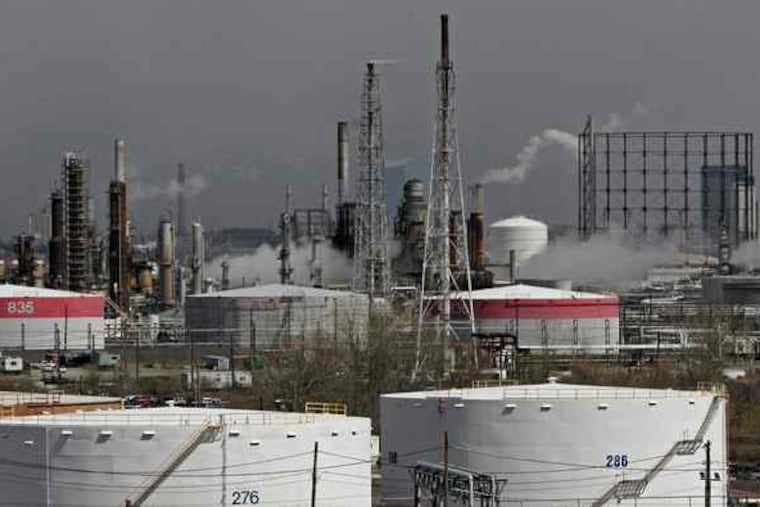Oil refiners: Cap-and-trade will cost
Oil refiners, including regional giant Sunoco Inc., say that proposed federal legislation aimed at curbing global warming could impair fuel production nationally and in the region, where it is a mainstay of the economy.

Oil refiners, including regional giant Sunoco Inc., say that proposed federal legislation aimed at curbing global warming could impair fuel production nationally and in the region, where it is a mainstay of the economy.
A study released this week by the American Petroleum Institute (API), the industry's trade group, projects that the cap-and-trade bill in its current form could cause a 17 percent reduction in U.S. refinery output by 2030. The reduction would be made up by doubling fuel imports from foreign refiners, who may not face climate restrictions.
API said the analysis by EnSys Energy shows the "devastating" effect the American Clean Energy and Security Act would have on U.S. jobs and energy security. While the proposed bill would dramatically reduce greenhouse-gas emissions from U.S. refineries, there would be only a slight worldwide reduction as fuel production shifted overseas, the study said.
Refining is big business along the Delaware River. The seven refineries in Pennsylvania, New Jersey, and Delaware employ about 3,000 people and can process 1.26 million barrels of oil a day, about 8.7 percent of the nation's capacity.
The study was released as the Senate prepares to consider the climate-change bill, sponsored by Reps. Henry A. Waxman (D., Calif.) and Ed Markey (D., Mass.). The bill narrowly passed the House in June, and it is likely to be substantially amended by the Senate.
Cap-and-trade is a method to control greenhouse gases by creating a market for emissions permits. The government would set a cap on emissions, but emitters that don't use their full quota could trade their excess permits to companies needing them. The caps would become gradually more restrictive.
Refiners complain because the proposed legislation would force them to become big buyers of the permits. Though refiners emit about 4 percent of the nation's greenhouse gases, they are held responsible for 44 percent of all emissions, including the exhaust from automobiles, planes, trains, and heating oil. But the bill would allocate only 2.25 percent of the permits to refiners.
"In its current form, the legislation will likely increase the cost of domestic refining so much - through the need to purchase credits, higher electricity costs, and the financial carrying costs to actually buy the allowances - that it will be cheaper to import gasoline, diesel, and other products from overseas," said Thomas P. Golembeski, spokesman for Sunoco, which is based in Philadelphia.
"Eventually, we would expect that higher domestic refining costs would force some U.S. refining capacity to close, which would mean the loss of jobs, tighter fuel supply, and higher fuel costs for consumers," Golembeski said.
Supporters of the cap-and-trade legislation say it would force a transition to clean energy by imposing market conditions that would penalize imported fossil fuels and reward development of renewable energy.
The API study said that in its worst-case scenario, the proposed law could reduce annual U.S. refining investments by up to $89.7 billion, reduce refinery utilization rates from 83.3 percent to as low as 63.4 percent, and would cut refinery production by up to 4.4 million barrels a day. Refineries on the Gulf Coast and in California would be hit hardest.
Sunoco, which has three refineries in the Philadelphia area, is not a member of API, but Golembeski said the company was aware of the study. He said Sunoco prefers a carbon tax levied directly upon sources of greenhouse gases, rather than the more complex cap-and-trade system.
"A transparent and direct carbon tax would be, in our view, a much more workable solution," Golembeski said.